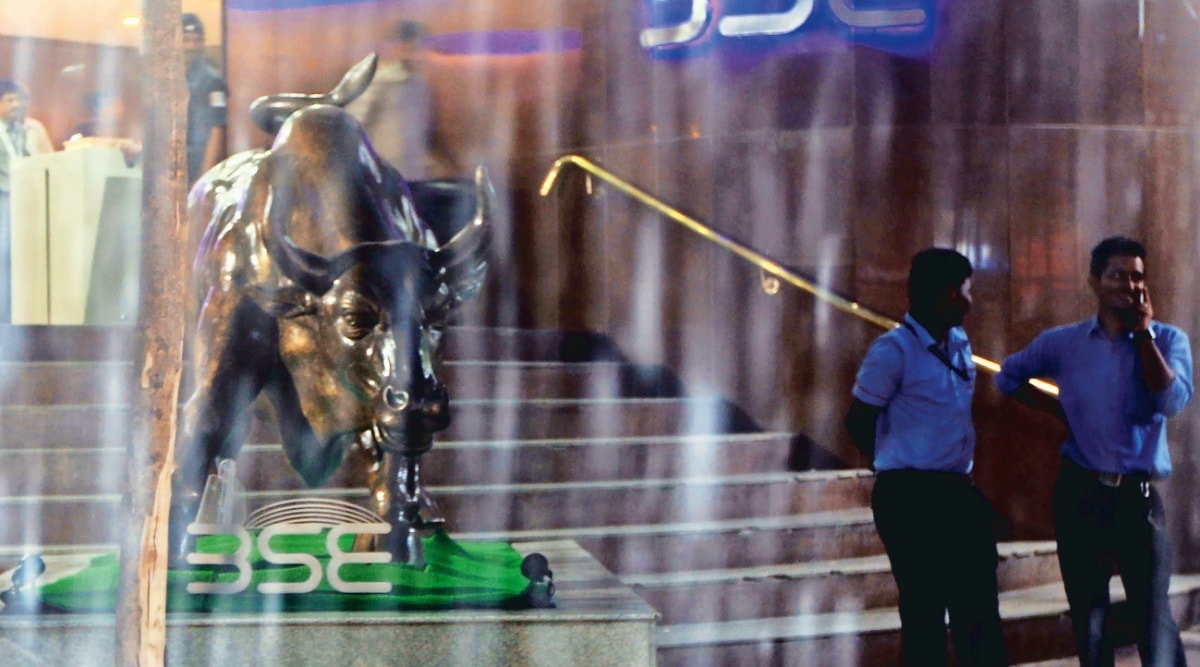 With topline companies coming under intense selling pressure, the benchmark Sensex at the Bombay Stock Exchange crashed 1,688 points or 2.9 per cent to close at a three-month low of 57,107.15.
With topline companies coming under intense selling pressure, the benchmark Sensex at the Bombay Stock Exchange crashed 1,688 points or 2.9 per cent to close at a three-month low of 57,107.15. Stock markets in India joined global markets in a sell-off on Friday as investors reacted with panic to the emergence of a heavily mutated variant of the coronavirus in Africa and the continuing surge of infections in Europe.
The fall in markets was also driven by anxiety that the US central bank may wrap up its stimulus programme and raise interest rates sooner than expected in the wake of rising inflation.
With topline companies coming under intense selling pressure, the benchmark Sensex at the Bombay Stock Exchange crashed 1,688 points or 2.9 per cent to close at a three-month low of 57,107.15. The NSE Nifty Index fell 510 points to 17,026.45.
The Sensex has now fallen 2,529 points or 4.24 per cent in the last five sessions, and is down 5,138 points or 8.2 per cent from its record high of 62,245 reached on October 19. Friday was the second time this week that India’s premier indices fell around 2 per cent or more, raising concerns among investors and market participants.
Pressure set to continue
Concerns around the new Covid variant, rise in fresh cases in European countries and likelihood of an earlier-than-expected wrapping up of the Fed’s stimulus programme and increase in interest rates, are likely to keep the markets under pressure in the near term.
The Sensex fell over 1,000 points or 1.7 per cent on Monday. Foreign portfolio investors (FPIs) have been pulling out funds from emerging economies, including a net of Rs 14,700 crore from Indian equities over the last three trading sessions.
The movement in the domestic markets on Friday was in line with those in other Asian markets, and was quickly followed by Europe. As fears mounted over the new B.1.1.529 variant, Europe’s Stoxx 600 fell as much as 3.6 per cent, and was down 2.7 per cent in late-morning trading. France’s CAC 40 index and Germany’s Dax were down by 3 per cent and 2.5 per cent respectively. London’s FTSE 100 index dropped 3 per cent. Crude oil benchmarks on both sides of the Atlantic fell more than 5 per cent, and the US dollar rallied, according to agency reports.
Analysts said that with some European countries in the grip of a Covid wave, markets were expected to remain volatile. “On the domestic front, broad-based sell-off was witnessed as investors dumped Covid-sensitive stocks, while focus was shifted towards the pharma sector amid growing concerns over the new variant with higher mutations,” Vinod Nair, head of research at Geojit Financial Services, said.
The tapering of bond purchases by the US Federal Reserve and the rising inflation fuelled speculation of an early hike in rates by the Fed, before the conclusion of the tapering of bond purchases. “These developments lent some strength to the dollar, and also prompted exit from emerging markets by foreign investors,” Joseph Thomas, head of research at Emkay Wealth Management, said.
Barring pharma, all sectors closed with losses. RIL shares lost 3.3 per cent at Rs 2412.15, SBI 4.09 per cent at Rs 470.50, Larsen & Toubro 3.88 per cent at Rs 1777.35, and Tata Steel 5.23 per cent at Rs 1112.25. Market capitalisation fell by around Rs 7 lakh crore to Rs 258.31 lakh crore.
Hotel, aviation, and tourism related stocks sank under heavy selling pressure. Interglobe Aviation fell 8.81 per cent. Indian Hotels crashed 11.13 per cent amid fears over fresh restrictions. The bank index lost 3.58 per cent.
“All we know so far is the B.1.1.529 is heavily mutated but markets are taking no chances, equities are falling, haven currencies such as the US dollar, Japanese yen and Swiss franc are rallying, commodity currencies such as the CAD, AUD and NZD are being sold, US 10-year bond yields have moved sharply lower, and oil has slumped. In other words, a classic risk-off, flight to safety move,” said Jeffrey Halley, senior market analyst, Asia Pacific, OANDA.
- The Indian Express website has been rated GREEN for its credibility and trustworthiness by Newsguard, a global service that rates news sources for their journalistic standards.

